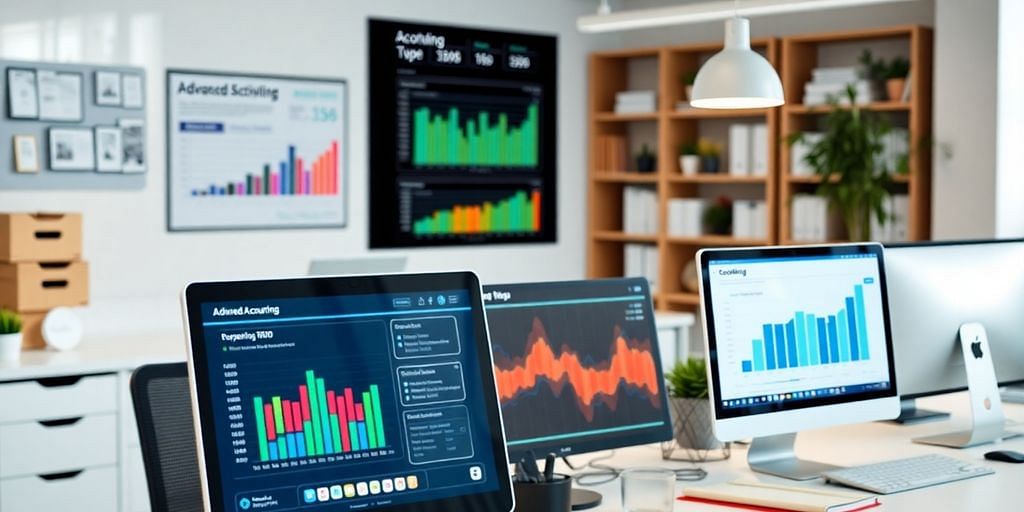
Revolutionizing Efficiency: The Future of Accounting Management Systems in 2025
Back To BlogThe Rise of AI and Automation in Accounting
We're seeing some serious changes in accounting, and it's all thanks to AI and automation. It's not just about making things a little easier; it's a full-blown revolution in how we handle finances. As we move further into 2025, it's clear that these technologies are becoming absolutely essential. Firms that get on board now will be way ahead of the game. Let's take a look at how this is all playing out.
Transforming Financial Tasks
AI is changing the game for a lot of those tedious, time-consuming tasks we used to dread. Think about data entry, report generation, and even basic auditing – AI can handle so much of it now. This frees us up to focus on the bigger picture, like strategic planning and client relations. Plus, it reduces the risk of human error, which is always a win. I've seen firms cut down the time spent on routine tasks by as much as 50%, which is pretty wild. It's not just about saving time, though; it's about using our skills where they really matter. For example, AI-powered tools can help with drafting emails or summarizing video calls.
Unlocking New Opportunities
It's not just about doing the same old things faster; AI is opening up entirely new possibilities. We can now offer clients more in-depth analysis, better forecasting, and more personalized advice. This is a huge deal because it lets us move beyond being just number crunchers and become true strategic partners. Plus, with AI handling the basics, we have more time to explore new markets and develop new services. The potential is really limitless. Here's a quick look at how AI is helping:
- Improved accuracy in financial forecasting
- Enhanced fraud detection capabilities
- Personalized financial advice for clients
AI is not here to replace us, but to augment our abilities. It's a tool that, when used correctly, can make us better at what we do and allow us to provide more value to our clients.
Streamlining Operations
AI and automation are making our operations smoother and more efficient than ever before. We're talking about things like automated invoice processing, reconciliation, and even tax preparation. This not only saves time and money but also reduces the stress and hassle of dealing with these tasks manually. Plus, it allows us to scale our operations more easily, which is crucial for growth. Many are using accounting technologies to streamline operations. Here's a simple comparison:
Cloud Accounting Software: Dominating the Market

It's pretty clear that cloud accounting software is changing how businesses handle their money. It gives you flexibility, makes things more efficient, and lets you see your data in real-time. With everyone needing to go digital, especially those mid-sized firms, cloud solutions are becoming super important.
Flexibility and Efficiency
Cloud accounting software is a game-changer because it lets us work from anywhere. This means we're not stuck in the office to manage finances. We can access data on any device, which is great for remote teams. Plus, it cuts down on manual tasks, which saves time and reduces errors. It's all about making things easier and faster.
Real-Time Data Access
Having real-time data is a huge advantage. We can see exactly where we stand financially at any moment. This helps us make better decisions and spot problems early. Plus, it makes collaboration easier because everyone is looking at the same, up-to-date information. It's like having a financial ecosystem at our fingertips.
The Shift to Digital Transformation
Cloud accounting is a big part of digital transformation. It's not just about moving to the cloud; it's about changing how we work. It helps us automate tasks, improve communication, and offer better service to clients. For mid-sized firms, it levels the playing field, letting them compete with bigger companies without spending a ton on IT. Choosing the right accounting software is key to making this shift successful.
Cloud accounting software is reshaping the way businesses manage their finances, offering flexibility, efficiency, and real-time access to data. It reduces reliance on traditional, on-premise systems, empowering accounting professionals to work smarter and deliver better results.
Future Trends in Accounting Management Systems
Okay, so what's coming down the pike for accounting management systems? It's not just about keeping the books anymore; it's about getting ahead of the curve. We're seeing some cool stuff on the horizon that's going to change how we all work. Let's jump in.
Embracing Sustainability Practices
More and more, businesses are realizing that being green isn't just good PR – it's good for the bottom line. We're talking about accounting systems that can track and report on environmental impacts, helping companies make smarter, more sustainable choices. Think about it: carbon accounting becoming as standard as financial accounting. It's a big shift, and we're here for it. We need to consider how third-party applications can help with this.
Enhancing Data Security
Okay, let's be real: data breaches are a nightmare. As accounting systems become more interconnected and rely on cloud storage, security is a HUGE deal. We're talking about next-level encryption, multi-factor authentication, and constant monitoring to keep sensitive financial data safe. It's not just about protecting ourselves; it's about protecting our clients and maintaining trust. Data security is paramount.
Leveraging Advanced Analytics
Forget just crunching numbers; we're moving into an era of predictive analytics. Imagine accounting systems that can forecast future financial performance, identify potential risks, and even suggest strategies for improvement. It's like having a crystal ball for your business. And with better data visualization, we can actually see what's going on and make smarter decisions faster.
This isn't just about making our jobs easier; it's about providing real, actionable insights that can drive business growth and success. It's about transforming accounting from a reactive function to a proactive one.
Here's a quick look at how analytics are changing the game:
- Improved forecasting accuracy
- Better risk management
- Data-driven decision making
- Enhanced efficiency
Skills for the Future of Accounting

It's pretty clear that the accounting world is changing fast. We need to think about what skills we'll all need to stay relevant and, honestly, just keep up. It's not just about crunching numbers anymore; it's about understanding the bigger picture and using technology to our advantage.
Continuous Learning and Adaptation
Things are changing so quickly, it's kind of wild. We absolutely have to commit to being lifelong learners. New software, new regulations, new everything—it's constant. If we don't keep learning, we're going to fall behind. Think of it like this: remember when everyone was freaking out about Excel? Now it's AI and cloud computing. What's next? We need to be ready for it. This also means being open to new ideas and ways of doing things. The old ways aren't always the best ways, especially with all the new tools coming out. We need to be adaptable and willing to try new things. For example, emerging accounting trends are showing a big shift towards automation.
Effective Communication
Okay, so maybe we're not all naturally gifted speakers, but communication is super important. It's not enough to just understand the numbers; we need to be able to explain them to people who don't. That means clients, colleagues, even the CEO. We need to be able to translate complex financial data into something everyone can understand. This includes:
- Active listening to understand client needs.
- Clearly explaining financial concepts.
- Presenting data in an understandable way.
Communication isn't just about talking; it's about listening and understanding. We need to be able to build relationships with clients and colleagues, and that starts with good communication skills.
Navigating Regulatory Changes
Ugh, regulations. Nobody loves them, but they're a fact of life. And they're always changing. We need to stay on top of all the new rules and make sure we're following them. This isn't just about avoiding fines; it's about doing things the right way. It can be a real headache, especially with regulations differing across different regions. But hey, that's part of the job. We need to be able to:
- Stay updated on new regulations.
- Understand the impact of those regulations.
- Implement changes to comply with them.
And honestly, sometimes it feels like the rules are designed to be confusing. But we've got to figure them out. It's all part of being a professional. To help with this, we should focus on improving our business intelligence skills.
As the world of accounting changes, it's important to learn new skills that will help you succeed. This means getting comfortable with technology, understanding data, and being able to communicate well. If you want to stay ahead in your accounting career, check out our website for more tips and resources!
Frequently Asked Questions
What are the main benefits of using AI in accounting?
AI helps speed up tasks like data entry and invoice processing, making accounting faster and more accurate. It also provides useful insights to help accountants make better decisions.
How does cloud accounting software improve efficiency?
Cloud accounting software lets businesses access their financial data anytime and anywhere. This means they can work more flexibly and get real-time updates on their finances.
What skills will accountants need in the future?
Accountants will need to keep learning new things, communicate well with others, and understand changing laws and rules in the accounting field.
